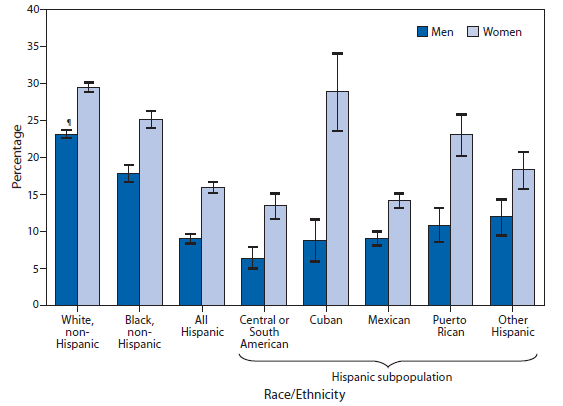Persons using assistive technology might not be able to fully access information in this file. For assistance, please send e-mail to: mmwrq@cdc.gov. Type 508 Accommodation and the title of the report in the subject line of e-mail.
QuickStats: Percentage of Adults Ever Told They Have Some Form of Arthritis or a Related Condition,* by Sex, Race/Ethnicity, and Hispanic† Subpopulation — National Health Interview Survey, United States, 2011§

* Based on a survey question that asked respondents, "Have you ever been told by a doctor or other health professional that you have some form of arthritis, rheumatoid arthritis, gout, lupus, or fibromyalgia?" Those that answered yes were classified as having an arthritis diagnosis. Unknowns were not included in the denominators when calculating percentages.
† Persons of Hispanic ethnicity might be of any race or combination of races. Non-Hispanic persons are those who are not of Hispanic ethnicity, regardless of race.
§ Estimates are based on household interviews of a sample of the noninstitutionalized U.S. civilian population.
¶ 95% confidence interval.
During 2011, in each racial/ethnic group considered, women were more likely than men to have been told by a doctor or other health professional that they have arthritis or a related condition. Among men and women, Hispanic adults were less likely than non-Hispanic white and non-Hispanic black adults to have been told that they have arthritis. Among Hispanic subpopulations, considerable variation occurred, with notably higher rates for Cuban and Puerto Rican women.
Source: National Health Interview Survey, 2011 sample adult core component. Available at http://www.cdc.gov/nchs/nhis.htm.
Reported by: Gulnur Freeman MPA, grs3@cdc.gov, 301-458-4085; Patricia F. Adams.
Alternate Text: The figure above shows the percentage of adults ever told they have some form of arthritis or a related condition, by sex, race/ethnicity, and Hispanic subpopulation in the United States during 2011. In each racial/ethnic group considered, women were more likely than men to have been told by a doctor or other health professional that they have arthritis or a related condition. Among men and women, Hispanic adults were less likely than non-Hispanic white and non-Hispanic black adults to have been told that they have arthritis. Among Hispanic subpopulations, considerable variation occurred, with notably higher rates for Cuban and Puerto Rican women.
Use of trade names and commercial sources is for identification only and does not imply endorsement by the U.S. Department of
Health and Human Services.
References to non-CDC sites on the Internet are
provided as a service to MMWR readers and do not constitute or imply
endorsement of these organizations or their programs by CDC or the U.S.
Department of Health and Human Services. CDC is not responsible for the content
of pages found at these sites. URL addresses listed in MMWR were current as of
the date of publication.
All MMWR HTML versions of articles are electronic conversions from typeset documents.
This conversion might result in character translation or format errors in the HTML version.
Users are referred to the electronic PDF version (http://www.cdc.gov/mmwr)
and/or the original MMWR paper copy for printable versions of official text, figures, and tables.
An original paper copy of this issue can be obtained from the Superintendent of Documents, U.S.
Government Printing Office (GPO), Washington, DC 20402-9371;
telephone: (202) 512-1800. Contact GPO for current prices.
**Questions or messages regarding errors in formatting should be addressed to
mmwrq@cdc.gov.


